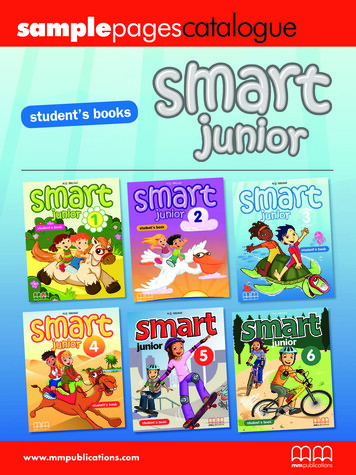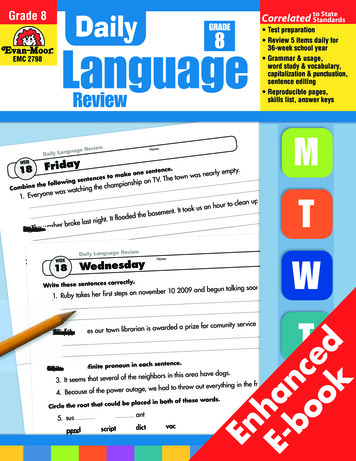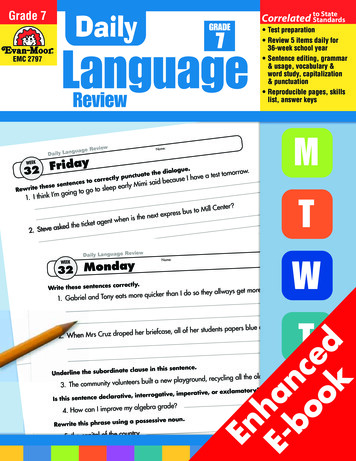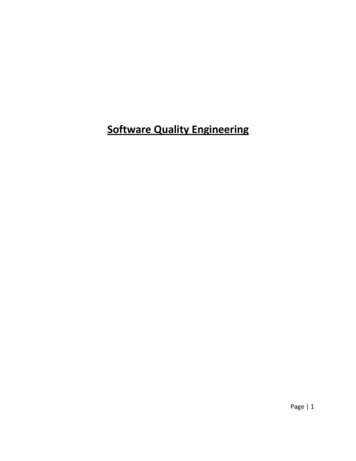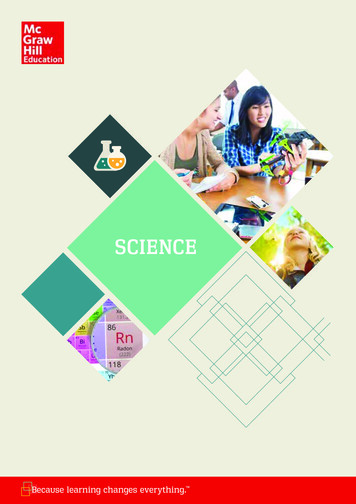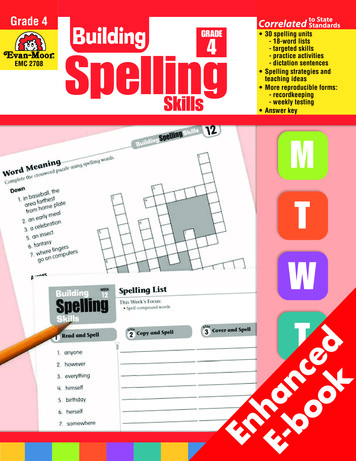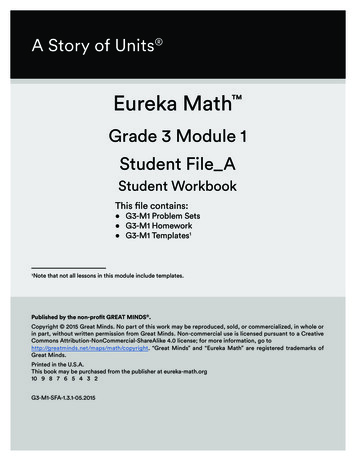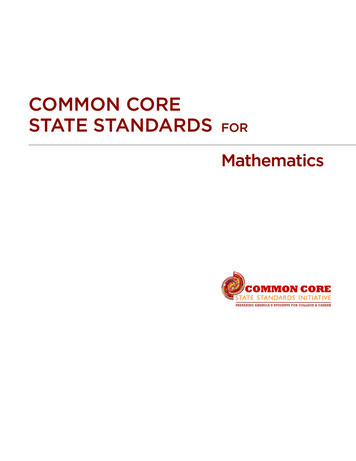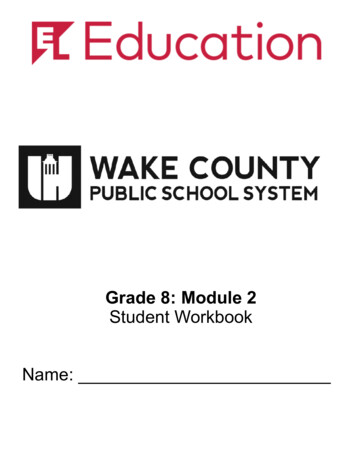
Transcription
Grade 8: Module 2Student WorkbookName:
GRADE 8: MODULE 2Unit 1: Lesson 1Notice/Wonder Note-catcherName:Date:NoticeCreated by EL Education, Inc. on behalf of Public Consulting Group, Inc. 2013 Public Consulting Group, Inc., with a perpetual license granted to EL Education, Inc.WonderELA Curriculum G8:M2 2
GRADE 8: MODULE 2Unit 1: Lesson 1The Lure of Shakespeare by Robert ButlerFrom Past to PresentMany people consider Shakespeare the greatest writer in the English language. His legions ofadmirers point with awe to the rhythm of his words and the wide range of human emotions heportrays and evokes. But has Shakespeare always been so popular? And how did an Elizabethan actorturned-playwright become a world-famous figure?From the start, Shakespeare was popular among the English. Shortly after his death, his plays werepublished in a collection known as the First Folio (1623), with a poem by Ben Jonson included thatfeatured the lines, "He was not of an age, but for all time!" The memory of Shakespeare remainedstrong among audiences as well, since his plays were produced regularly by many companies.But in 1642. during the English Civil War, the theaters of London were closed by order of theGovernment and remained so for 18 years. By the time they reopened in 1660, styles had changed.The court of the new king wanted a more elegant, refined, classical world, and Shakespeare struckthem as coarse in his language and careless in his plots. His comedies, in particular, fell out of favor asthe years passed.By the 1700s, however, a turnaround had begun. The first new edition of his plays in nearly a century,along with the first biography ever written, appeared in 1709 and immediately sparked a Shakespearerevival. Despite continuing questions about his style, which led many producers to cut or alter hisplays (sometimes even writing new endings for them), audiences were enthusiastic. Greatperformances also helped. David Garrick, the greatest actor of the century, and Sarah Siddons, thegreatest actress, were both enthusiasticShakespeare supporters and starred in many of his plays at the Drury Lane Theatre.In the 1800s, Shakespeare's popularity soared. Multivolume editions of his plays were published,exuberant productions and extravagant sets supported stars such as Fanny Kemble and EdmundKean, and touring companies brought small-scale versions of Shakespeare to towns and villageseverywhere.In the 20th century, Shakespeare remained as popular as ever, with actors such as Sir LaurenceOlivier, Sir John Gielgud, and Kenneth Branagh bringing his characters to life. Students around theworld now read Shakespeare in literature classes, and his plays areCreated by EL Education, Inc. on behalf of Public Consulting Group, Inc. 2013 Public Consulting Group, Inc., with a perpetual license granted to EL Education, Inc.ELA Curriculum G8:M2 3
GRADE 8: MODULE 2Unit 1: Lesson 1The Lure of Shakespeare by Robert Butlersometimes staged in modern-day costume to emphasize his significance to today's world.More remarkable is the story of Shakespeare's popularity in other lands.News of Shakespeare's talent spread even during his lifetime. Occasionally, a foreign merchant ordiplomat saw a Shakespearean production. In 1601, the Russian ambassador was present whenTwelfth Night was first performed. Traveling companies of English actors staged some ofShakespeare's plays in Germany and Poland while the playwright was still alive. But it was the greatFrench author Voltaire who truly popularized Shakespeare beyond English shores in the 1730s. Fromthat time onward, Shakespeare's works have been extensively studied and performed around theworld.In America, copies of the plays are believed to have circulated in the late 1600s, and the firstperformance was Romeo and Juliet in the early 1700s. A century later, Americans practicallyworshiped Shakespeare. Philosopher and poet Ralph Waldo Emerson called him "the first poet of theworld." In the 1900s, Shakespeare's works were being translated and printed in India, Africa, China,and Japan.In the 20th century, a new medium inspired countless variations on the Shakespeare canon: themovies. Some have been filmed as recreated plays, such us Romeo and Juliet (1968) or Henry V(1989). Others were adapted stories in modern settings such as West Side Story (1961) or Richard III(1995). Still others were transposed into stories in a completely different land and culture such as Ran(1985), a Japanese tale of samurai based mostly on King Lear.Whether recorded or live, the performance of a major Shakespeare role is traditionally seen as theultimate test of an actor's ability. From Richard Burbage in the 1500s to Ian McKellen and Judi Denchtoday, the greatest actors are those who are able to master Shakespeare. By itself, this is the mostenduring tribute to the theatrical talent of William Shakespeare, the Bard of Avon.From Calliope issue: William Shakespeare, Master Playwright, 2005 Carus Publishing Company, published by Cobblestone Publishing, 30 Grove Street, Suite C,Peterborough, NH 03458. All Rights Reserved. Used by permission of the publisher. www.cobblestonepub.Unit 1: Lesson 1Created by EL Education, Inc. on behalf of Public Consulting Group, Inc. 2013 Public Consulting Group, Inc., with a perpetual license granted to EL Education, Inc.ELA Curriculum G8:M2 4
GRADE 8: MODULE 2Advantages/Disadvantages T-ChartName:Date:Shakespeare ImagesWhat did you learn about the universal appeal of Shakespeare from looking at the images?What are the advantages of using images inlearning about this topic? How is it positive orhelpful?Created by EL Education, Inc. on behalf of Public Consulting Group, Inc. 2013 Public Consulting Group, Inc., with a perpetual license granted to EL Education, Inc.What are the disadvantages of using images inlearning about this topic? How is it negative orunhelpful?ELA Curriculum G8:M2 5
GRADE 8: MODULE 2Unit 1:Lesson 1Advantages/Disadvantages T-Chart“The Lure of Shakespeare”What did you learn about the universal appeal of Shakespeare from reading the text?What are the advantages of reading text to learnabout this topic? How is it positive or helpful?Created by EL Education, Inc. on behalf of Public Consulting Group, Inc. 2013 Public Consulting Group, Inc., with a perpetual license granted to EL Education, Inc.What are the disadvantages of reading text tolearn about this topic? How is it negative orunhelpful?ELA Curriculum G8:M2 6
GRADE 8: MODULE 2The Shakespeare ShakedownNewsweek, October 24, 2011Byline: Simon SchamaThe new film 'Anonymous' says the Bard was a fraud. Don't buy it.Roland Emmerich's inadvertently1 comic new movie, Anonymous, purports to announce to the worldthat the works we deluded souls imagine to have been written by one William Shakespeare wereactually penned by Edward de Vere, the 17th Earl of Oxford. James Shapiro's fine book Contested Willchronicles the long obsession with depriving Shakespeare of authentic authorship of his works, mostlyon the grounds that no manuscripts survive but also that his cultural provenance2 was too lowly, andhis education too rudimentary3, to have allowed him to penetrate the minds of kings and courtiers.Only someone from the upper crust, widely traveled and educated at the highest level, this argumentruns, could have had the intellectual wherewithal to have created, say, Julius Caesar.Alternative candidates for the "real" Shakespeare have numbered the Cambridge-schooledChristopher Marlowe (who also happens to have been killed before the greatest of Shakespeare's playsappeared) and the philosopher-statesman Francis Bacon. But the hottest candidate for some time hasbeen the Earl of Oxford, himself a patron of dramatists, a courtier-poet of middling talent, and anadventurer who was at various times banished from the court and captured by pirates. The Oxfordtheory has been doing the rounds since 1920, when an English scholar, Thomas Looney (pronouncedLoaney), first brought it before the world.None of which would matter very much were there not something repellent at the heart of the theory,and that something is the toad, snobbery—the engine that drives the Oxfordian case against the son ofthe Stratford glover John Shakespeare. John was indeed illiterate. But his son was not, as we knowincontrovertibly4 from no fewer than six surviving signatures in Shakespeare's own flowing hand, thefirst from 1612, when he was giving evidence in a domestic lawsuit.The Earl of Oxford was learned and, by reports, witty. But publicity materials for Anonymous say thatShakespeare by comparison went to a mere "village school" and so could hardly have compared withthe cultural richness imbibed by Oxford. The hell he couldn't! Stratford was no "village," and the"grammar school," which means elementary education in America, was in fact a cradle of seriousclassical learning in Elizabethan England. By the time he was 13 or so, Shakespeare would have readInadvertently: accidentallyProvenance: background3 rudimentary: basic or simple4 incontrovertibly: certainly or undoubtedly12Created by EL Education, Inc. on behalf of Public Consulting Group, Inc. 2013 Public Consulting Group, Inc., with a perpetual license granted to EL Education, Inc.ELA Curriculum G8:M2 7
GRADE 8: MODULE 2(in Latin) works by Terence, Plautus, Virgil, Erasmus, Cicero, and probably Plutarch and Livy too.One of the great stories of the age was what such schooling did for boys of humble birth.The Shakespeare ShakedownHow could Shakespeare have known all about kings and queens and courtiers? By writing for themand playing before them over and over again—nearly a hundred performances before Elizabeth andJames, almost 20 times a year in the latter case. His plays were published in quarto from 1598 withhis name on the page. The notion that the monarchs would have been gulled into thinking he was thetrue author, when in fact he wasn't, beggars belief.The real problem is not all this idiotic misunderstanding of history and the world of the theater but afatal lack of imagination on the subject of the imagination. The greatness of Shakespeare is preciselythat he did not conform to social type—that he was, in the words of the critic William Hazlitt, "no oneand everyone." He didn't need to go to Italy because Rome had come to him at school and came againin the travels of his roaming mind. His capacity for imaginative extension was socially limitless too:reaching into the speech of tavern tarts as well as archbishops and kings. It is precisely thisquicksilver5, protean6 quality that of course stirs the craving in our flat-footed celeb culture for somemore fully fleshed-out Author.That's what, thank heavens, the shape-shifting Shakespeare denies us. But he gives us everything andeveryone else. As Hazlitt beautifully and perfectly put it, "He was just like any other man, but that hewas like all other men. He was the least of an egotist that it was possible to be. He was nothing inhimself, but he was all that others were, or that they could become."By Simon SchamaFull Text: COPYRIGHT 2011 Newsweek Daily Beast Company LLC. All rights reserved. Any reuse,distribution or alteration without express written permission of the publisher is prohibited. For st.com/newsweek.htmlSource Citation56quicksilver: changeableprotean: adjustableCreated by EL Education, Inc. on behalf of Public Consulting Group, Inc. 2013 Public Consulting Group, Inc., with a perpetual license granted to EL Education, Inc.ELA Curriculum G8:M2 8
GRADE 8: MODULE 2Unit 1 Lesson 2“The Shakespeare Shakedown”: Lesson 2 Text-Dependent QuestionsName:Date:Approaching the TextNotesWho is the author?What is the title?What type of text is it?Who is the audience?Read the text silently in your head as you hear it read aloud.Text-Dependent QuestionsNotes1. What does the word anonymousmean?2. In James Shapiro’s bookContested Will, what evidence orreasons does he attribute to thosewho want to deprive“Shakespeare of authenticauthorship of his works”?Created by EL Education, Inc. on behalf of Public Consulting Group, Inc. 2013 Public Consulting Group, Inc., with a perpetual license granted to EL Education, Inc.ELA Curriculum G8:M2 9
GRADE 8: MODULE 2Unit 1 Lesson 2“The Shakespeare Shakedown”: Lesson 2 Text-Dependent QuestionsText-Dependent QuestionsNotes3. Look at Paragraph B. What credentials does theEarl of Oxford have for beingthe “real Shakespeare”? What does the term “patronof dramatists” mean? What does the term“courtier-poet of middlingtalent” mean?4. Look at Paragraph C.What is the first supporting claimor reason Schama gives tosupport the central claim aboutthe authenticity of Shakespeare’sauthorship?5. Look at Paragraph D.What is the second supportingclaim or reason Schama gives tosupport the authenticity ofShakespeare’s authorship?6. Look at Paragraph E.What is the last supporting detailor reason Schama gives tosupport the authenticity ofShakespeare’s authorship?7. Look at Paragraph F.According to Schama, why dosome question the authenticity ofShakespeare’s authorship?Created by EL Education, Inc. on behalf of Public Consulting Group, Inc. 2013 Public Consulting Group, Inc., with a perpetual license granted to EL Education, Inc.ELA Curriculum G8:M2 10
GRADE 8: MODULE 2Unit 1 Lesson 3Discussion AppointmentsMake one appointment at each location.In Albany:In Buffalo:In New York City:In Rochester:In Syracuse:Created by EL Education, Inc. on behalf of Public Consulting Group, Inc. 2013 Public Consulting Group, Inc., with a perpetual license granted to EL Education, Inc.ELA Curriculum G8:M2 11
GRADE 8: MODULE 2Name:Date:Unit 1 Lesson 3“The Shakespeare Shakedown”: Lesson 3 Text-Dependent QuestionsChalk Talk QuestionsNotes1. What is Simon Schamathinking and saying aboutwho wrote the worksattributed to Shakespeare?2. Who is the intendedaudience of the speech?Additional Text Dependent Questions3. Reread the article.Where does Schamaacknowledge otherviewpoints?4. How does Schama respondto these counterclaims orother viewpoints?5. Why does Schama identifycounterclaims?6. What is the author’spurpose in this article?Created by EL Education, Inc. on behalf of Public Consulting Group, Inc. 2013 Public Consulting Group, Inc., with a perpetual license granted to EL Education, Inc.ELA Curriculum G8:M2 12
GRADE 8: MODULE 2Unit 1 Lesson 3Lesson 3 Homework: Vocabulary in “TheShakespeare Shakedown”Name:Date:Directions: In the chart below, write the words you circled in “The Shakespeare Shakedown.” Doyour best to infer the meaning of the word from the context and write it in the right hand column.WordParagraph Inferred MeaningLetterCreated by EL Education, Inc. on behalf of Public Consulting Group, Inc. 2013 Public Consulting Group, Inc., with a perpetual license granted to EL Education, Inc.ELA Curriculum G8:M2 13
GRADE 8: MODULE 2Unit 1 Lesson 4Evaluating Evidence Note-catcherName:Date:Supporting ClaimWhat piece of evidencedoes Schama use to bestback up that supportingclaim?Created by EL Education, Inc. on behalf of Public Consulting Group, Inc. 2013 Public Consulting Group, Inc., with a perpetual license granted to EL Education, Inc.Why is that the bestevidence?ELA Curriculum G8:M2 14
GRADE 8: MODULE 2Unit 1 Lesson 4Summary Writing Graphic OrganizerName:Date:When you are reading actively, one of the most important things you do is figure out the point of thetext. This means you are recognizing its controlling idea. In this case, the controlling idea is theauthor’s central claim that he uses to build his whole argument.Once you have done that, you have really done the hardest work.Still, there is more. You need to figure out which are the key details in the text (hint: think about theauthor’s claims).Finally, write a great closing sentence, a clincher.Once that is done, you are ready to write up the notes into a summary paragraph. At that point,you will have gotten a good, basic understanding of the text you are reading.Controlling IdeaKeydetailKeydetailKeydetailClincherCreated by EL Education, Inc. on behalf of Public Consulting Group, Inc. 2013 Public Consulting Group, Inc., with a perpetual license granted to EL Education, Inc.ELA Curriculum G8:M2 15
GRADE 8: MODULE 2Unit 1 Lesson 5“The Shakespeare Shakedown”: Analyzing Text Structure Note-catcher (Side 1)Name:Date:QuestionsNotesReread Paragraph F andanswer these questions:1. Read the paragraph aloudwith your partner. Tryparaphrasing the firstsentence. What job is thissentence doing in theparagraph?2. How is the second sentencerelated to this topicsentence? What job is itdoing in the paragraph?Created by EL Education, Inc. on behalf of Public Consulting Group, Inc. 2013 Public Consulting Group, Inc., with a perpetual license granted to EL Education, Inc.ELA Curriculum G8:M2 16
GRADE 8: MODULE 2Unit 1 Lesson 5“The Shakespeare Shakedown”: Analyzing Text Structure Note-catcher (Side 1)QuestionsNotes3. In the next three sentences,Schama gives some moredetails related to the lastsentence. What job are thesethree sentences doing in theparagraph?4. With your partner,paraphrase the last sentence.How does this sentencerelate to the first sentence ofthe paragraph? Why do youthink the author ends theparagraph this way?Created by EL Education, Inc. on behalf of Public Consulting Group, Inc. 2013 Public Consulting Group, Inc., with a perpetual license granted to EL Education, Inc.ELA Curriculum G8:M2 17
GRADE 8: MODULE 2Unit 1 Lesson 5“The Shakespeare Shakedown”: Analyzing Text Structure Note-catcher (Side 2)QuestionsNotesReread Paragraph E and answerthese questions:1. Read the paragraph aloud withyour partner. Try paraphrasingthe first sentence. What job isthis sentence doing in theparagraph?2. How is the second sentencerelated to this topic sentence?What job is it doing in theparagraph?3. In the next sentence, whymight it be important thatShakespeare’s plays werepublished in 1598 and his namewas on the publication? Whatjob is this sentence doing in theparagraph?4. With your partner, paraphrasethe last sentence. How doesthis sentence relate to the firstsentence of the paragraph?Why do you think the authorends the paragraph this waCreated by EL Education, Inc. on behalf of Public Consulting Group, Inc. 2013 Public Consulting Group, Inc., with a perpetual license granted to EL Education, Inc.ELA Curriculum G8:M2 18
GRADE 8: MODULE 2Unit 1 Lesson 6QuickWrite 2Name:Date:You have learned a lot about the arguments for both sides of the question regarding the authorship ofShakespeare. Based on what you have read, which argument do you find most credible? Why?Use specific evidence from the text to write a paragraph that answers this prompt. Answer the prompt completely. Provide relevant and complete evidence. Your paragraph should include:– A focus statement stating which argument you believe is the most credible– At least three pieces of evidence from the text– For each piece of evidence, an analysis or explanation: What does this evidence mean?– A concluding sentenceCreated by EL Education, Inc. on behalf of Public Consulting Group, Inc. 2013 Public Consulting Group, Inc., with a perpetual license granted to EL Education, Inc.ELA Curriculum G8:M2 19
GRADE 8: MODULE 2Name:Unit 1 Lesson 7Shakespeare's Universal Appeal ExaminedDate:Tuesday, Apr 24, 2012, 10:30 IST Agency: Daily TelegraphJonathan BateBritain's greatest playwright has been embraced by every age and every nation. On the anniversary of theBard's birth and death, Jonathan Bate explains why the world has claimed him for its own."After God," said the 19th-century novelist Alexandre Dumas, "Shakespeare has created most." No other bodyof writing in the history of world literature has been peopled with characters and situations of such variety,such breadth and depth. No other writer has exercised such a universal appeal.My first date with my future wife was a production of Richard III in Romanian. We didn't understand a word ofthe dialogue, but the atmosphere in the little theatre in Manchester was electric. I have seen a mesmerisingTitus Andronicus in Japanese and another that came straight from the townships of post-apartheid SouthAfrica. One of the most influential modern books on the plays, entitled Shakespeare Our Contemporary, wasby a Polish Communist. During the Iran-Iraq war, a general spurred his tanks into battle by quotingfrom Henry V. Half the schoolchildren in the world are at some point exposed to Shakespeare's work.But what is the source of the universal appeal of this balding middle-class gentleman, born in a littleWarwickshire market town in the reign of the first Queen Elizabeth? Why would the world's newest country,South Sudan, choose to put on a production of Cymbeline? Or Sunnis and Shias opt to relocate the storyof Romeo and Juliet in Baghdad? What is it about Richard III that appeals to Brazilians, or Othello to theGreeks?When his collected plays were published a few years after his death in the weighty book known as the FirstFolio, his friend and rival Ben Jonson wrote a prefatory poem claiming that Shakespeare was as great adramatist as the classicists of ancient Greece and Rome, and that one day "all scenes of Europe" would payhomage to him. This proved prophetic: Shakespeare did indeed exercise a decisive influence on the culturaland political history of Europe in the 18th and 19th centuries, shaping key aspects of the Romantic movement,the Revolutionary consciousness, the rise of nationalism and the nation state, of the novel, the idea of romanticlove, the notion of the existential self, and much more. In the 20th century, thanks to translation and film, thatinfluence spread around the world.Created by EL Education, Inc. on behalf of Public Consulting Group, Inc. 2013 Public Consulting Group, Inc., with a perpetual license granted to EL Education, Inc.ELA Curriculum G8:M2 20
GRADE 8: MODULE 2Unit 1 Lesson 7Shakespeare's Universal Appeal ExaminedJonson's poem described Shakespeare in two contradictory ways, and in that contradiction is to be found the key to hisuniversality. He was, says Jonson, the "Soul of the Age," yet he was also "not of an age, but for all time." Shakespearerecognised that human affairs always embody a combination of permanent truths and historical contingencies (in his ownterms, "nature" and "custom"). He was "not of an age" because he worked with archetypal characters, core plots andperennial conflicts, dramatising the competing demands of the living and the dead, the old and the young, men andwomen, self and society, integrity and role-play, insiders and outsiders. He grasped the structural conflicts shared by allsocieties: religious against secular, country against city, birth against education, strong leadership against the people'svoice, the code of masculine honour against the energies of erotic desire.Yet he also addressed the conflicts of his own historical moment: the transition from Catholicism to Protestantism andfeudalism to modernity, the origins of global consciousness, the conflict between new ideas and old superstitions, theformation of national identity, the growth of trade and immigration, the encounter with a "brave new world" overseas, thepolitics of war, new attitudes to blacks and Muslims, new voices for women and children.Shakespeare endures because with each new turn of history, a new dimension of his work opens up before us. When KingGeorge III went mad, King Lear was kept off the stage—it was just too close to the truth. During the Cold War, Lear againbecame Shakespeare's hottest play, its combination of starkness and absurdity answering to the mood of the age, leadingthe Polish critic Jan Kott to compare it to Samuel Beckett's Endgame and inspiring both the Russian Grigori Kozintsevand the Englishman Peter Brook to make darkly brilliant film versions.Because Shakespeare was supremely attuned to his own historical moment, but never wholly constrained within it, hisworks lived on after his death through something similar to the Darwinian principle of adaptation. The key to Darwin'stheory of evolution is the survival of the fittest. Species survive according to their capacity to adapt, to evolve according toenvironmental circumstances. As with natural selection, the quality that makes a really successful, enduring culturalartifact is its capacity to change in response to new circumstances. Shakespeare's plays, because they are so various and soopen to interpretation, so lacking in dogma, have achieved this trick more fully than any other work of the humanimagination.Shakespeare's life did not cease with the "necessary end" of his death 398 years ago on April 23, 1616.His plays continue to live, and to give life, four centuries on, all the way across the great theatre of the world. Telegraph Media Group Limited 2012Created by EL Education, Inc. on behalf of Public Consulting Group, Inc. 2013 Public Consulting Group, Inc., with a perpetual license granted to EL Education, Inc.ELA Curriculum G8:M2 21
GRADE 8: MODULE 2Unit 1 Lesson 7Frayer Model: ControlName:Date:DefinitionExamplesCreated by EL Education, Inc. on behalf of Public Consulting Group, Inc. 2013 Public Consulting Group, Inc., with a perpetual license granted to EL Education, ELA Curriculum G8:M2 22
GRADE 8: MODULE 2Unit 1 Lesson 7Guiding Questions “Why do Shakespeare’s works hold a universal appeal?” “What motivates people to try to control each other’s actions?” “Is it possible to control another person’s actions in the long run?”Created by EL Education, Inc. on behalf of Public Consulting Group, Inc. 2013 Public Consulting Group, Inc., with a perpetual license granted to EL Education, Inc.ELA Curriculum G8:M2 23
GRADE 8: MODULE 2Name:Date:Unit 1 Lesson 7QuickWrite 3Directions: Based on your knowledge of the universal appeal of Shakespeare, what might make thetheme of control appealing or interesting to people of different ages, genders, ethnicities, etc.?Use specific evidence from the text to write a paragraph that answers this prompt. Answer the prompt completely Provide relevant and complete details Your paragraph should include:– A focus statement stating your thinking– At least three reasons to support your thinking– For each piece of evidence, an analysis or explanation: What does this evidence mean?– A concluding sentenceCreated by EL Education, Inc. on behalf of Public Consulting Group, Inc. 2013 Public Consulting Group, Inc., with a perpetual license granted to EL Education, Inc.ELA Curriculum G8:M2 24
GRADE 8: MODULE 2Unit 1 Lesson 8A Midsummer Night’s DreamAct 1, Scene 2Name:Date:Enter Quince the carpenter, and Snug the joiner, and Bottom the weaver, and Flute the bellowsmender, and Snout the tinker, and Starveling the tailor.QUINCE: Is all our company here?BOTTOM: You were best to call them generally, man by man, according to the scrip.QUINCE: Here is the scroll of every man’s name which is thought fit, through all Athens, to play inour interlude before the Duke and Duchess on his wedding day at night.BOTTOM: First, good Peter Quince, say what the play treats on, then read the names of the actors,and so grow to a point.QUINCE: Marry, our play is “The most lamentable comedy and most cruel death of Pyramus andThisbe.”BOTTOM: A very good piece of work, I assure you, and a merry. Now, good Peter Quince, call forthyour actors by the scroll. Masters, spread yourselves.Created by EL Education, Inc. on behalf of Public Consulting Group, Inc. 2013 Public Consulting Group, Inc., with a perpetual license granted to EL Education, Inc.ELA Curriculum G8:M2 25
GRADE 8: MODULE 2Unit 1 Lesson 8A Midsummer Night’s DreamAct 1, Scene 2QUINCE: Answer as I call you. Nick Bottom, the weaver.BOTTOM: Ready. Name what part I am for, and proceed.QUINCE: You, Nick Bottom, are set down for Pyramus.BOTTOM: What is Pyramus—a lover or a tyrant?QUINCE: A lover that kills himself most gallant for love.BOTTOM: That will ask some tears in the true performing of it. If I do it, let the audience look to theireyes. I will move storms; I will condole in some measure. To the rest.—Yet my chief humor is for atyrant. I could play Ercles rarely, or a part to tear a cat in, to make all split:The raging rocksAnd shivering shocksShall break the locksOf prison gates.And Phibbus’ carShall shine from farAnd make and marThe foolish Fates.Created by EL Education, Inc. on behalf of Public Consulting Group, Inc. 2013 Public Consulting Group, Inc., with a perpetual license granted to EL Education, Inc.ELA Curriculum G8:M2 26
GRADE 8: MODULE 2Unit 1 Lesson 8A Midsummer Night’s DreamAct 1, Scene 2This was lofty. Now name the rest of the players. This is Ercles’ vein, a tyrant’s vein. A lover is morecondoling.QUINCE: Francis Flute, the bellows-mender.FLUTE: Here, Peter Quince.QUINCE: Flute, you must take Thisbe on you.FLUTE: What is Thisbe—a wand’ring knight?QUINCE: It is the lady that Pyramus must love.FLUTE: Nay, faith, let me not play a woman. I have a beard coming.QUINCE: That’s all one. You shall play it in a mask, and you may speak as small as you will.BOTTOM: An I may hide my face, let me play Thisbe too. I’ll speak in a monstrous little voice:“Thisne, Thisne!”—“Ah Pyramus, my lover dear! Thy Thisbe dear and lady dear!”Created by EL Education, Inc. on behalf of Public Consulting Group, Inc. 2013 Public Consulting Group, Inc., with a perpetual license granted to EL Education, Inc.ELA Curriculum G8:M2 27
GRADE 8: MODULE 2Unit 1 Lesson 8A Midsummer Night’s DreamAct 1, Scene 2QUINCE: No, no, you must play Pyramus—and, Flute, you Thisbe.BOTTOM: Well, proceed.QUINCE: Robin Starveling, the tailor.STARVELING: Here, Peter Quince.QUINCE: Robin Starveling, you must play Thisbe’s mother.—Tom Snout
Grade 8: Module 2 Student Workbook Name: _ GRADE 8: MODULE 2 Created by EL Education, Inc. on behalf of Public Consulting Group, Inc. . 1 comic new movie, Anonymous, purports to announce to the world that the works we deluded souls ima
